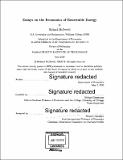| dc.contributor.advisor | Michael Greenstone. | en_US |
| dc.contributor.author | McDowell, Richard, Ph. D. Massachusetts Institute of Technology | en_US |
| dc.contributor.other | Massachusetts Institute of Technology. Department of Economics. | en_US |
| dc.date.accessioned | 2016-09-30T19:31:41Z | |
| dc.date.available | 2016-09-30T19:31:41Z | |
| dc.date.copyright | 2016 | en_US |
| dc.date.issued | 2016 | en_US |
| dc.identifier.uri | http://hdl.handle.net/1721.1/104487 | |
| dc.description | Thesis: Ph. D., Massachusetts Institute of Technology, Department of Economics, 2016. | en_US |
| dc.description | Cataloged from PDF version of thesis. | en_US |
| dc.description | Includes bibliographical references (pages 139-144). | en_US |
| dc.description.abstract | This dissertation addresses three questions related to the economics of renewable energy. Chapter 1 studies learning-by-doing during the generation process at wind and solar farms in the United States. While this phenomenon is often cited as a rationale for subsidizing renewable electricity, there is relatively little project-level evidence on how knowledge is accrued. Using detailed atmospheric data to account for potential output, I study whether generation and installation experience leads to increased productivity for solar and wind projects. I further assess the appropriability of experience by considering the transfer of knowledge within and across firms. Results suggest that generation experience on a particular project leads to higher productivity at that project but not at other sites. Installation experience appears to lead to higher output on subsequent projects, and exhibits spillovers across owners with proximate installation sites for wind farms. Chapter 2, co-authored with Michael Greenstone, studies the impact of Renewable Portfolio Standards, which mandate electricity sales from renewable sources, on electricity markets. Despite their prevalence and scope, the cost-effectiveness of these policies is currently poorly understood. Using panel data on program characteristics, electricity prices, generation, and employment, we find that portfolio standards have been successful at increasing regional renewable generation, with marginal compliance coming almost entirely from wind energy. However, costs to consumers are large, with retail electricity rates increasing by 9-15% five years after adoption. Based on our estimates, the cost of carbon abatement from these programs is substantial, and well above conventional estimates of the social cost of emissions. In the third chapter, I examine the extent to which electricity prices influence household purchases of Energy Star appliances. I combine a large cross-sectional survey dataset on appliance ownership and household characteristics with data on local electricity prices. Across three different appliance types, I find an elasticity of Energy Star ownership to retail electricity price of 0.58 to 0.66. In line with the "landlord-tenant" problem discussed in the energy efficiency literature, both ownership rates and responsiveness tp prices are substanitally lower for rented properties, particularly those with lower income tenants. | en_US |
| dc.description.statementofresponsibility | by Richard McDowell. | en_US |
| dc.format.extent | 144 pages | en_US |
| dc.language.iso | eng | en_US |
| dc.publisher | Massachusetts Institute of Technology | en_US |
| dc.rights | M.I.T. theses are protected by copyright. They may be viewed from this source for any purpose, but reproduction or distribution in any format is prohibited without written permission. See provided URL for inquiries about permission. | en_US |
| dc.rights.uri | http://dspace.mit.edu/handle/1721.1/7582 | en_US |
| dc.subject | Economics. | en_US |
| dc.title | Essays on the economics of renewable energy | en_US |
| dc.type | Thesis | en_US |
| dc.description.degree | Ph. D. | en_US |
| dc.contributor.department | Massachusetts Institute of Technology. Department of Economics | |
| dc.identifier.oclc | 958145853 | en_US |
